Nikita Veremeev
23.11.2025 | 6 min read
Updated: 23.11.2025
In 2025 the global digital assets market exceeded $2.5 trillion, and the number of crypto projects facing regulatory claims grew by 40% over the past two years. In the EU alone more than 300 tokens were blocked last year due to the absence of a proper legal opinion. How do you structure a business so as not to become one of those who lose investments and partners’ trust because of legal missteps? Why is a Legal Opinion for crypto projects becoming not just a formality but a critical element of a strategy for entering the international market?
In a situation where borders between jurisdictions are fading and regulators’ requirements are tightening, even one unaddressed risk can lead to a token being blocked, lawsuits, or the inability to list on an exchange. I see every day how entrepreneurs who ignore Legal Opinion requirements lose months and hundreds of thousands of euros, whereas those who approach the issue systematically gain access to investment, protect investors’ interests, and scale their business without fear of sanctions.
In this article I will examine in detail what a Legal Opinion for crypto projects is, what features and risks accompany its preparation, and I will also provide practical recommendations based on COREDO’s experience supporting dozens of international projects in the EU, Asia and the CIS. If you want not just to survive but to become a leader in the digital assets market, read to the end: you will receive strategic tools and a clear action plan.
Legal Opinion for crypto projects – what it is and why it’s needed
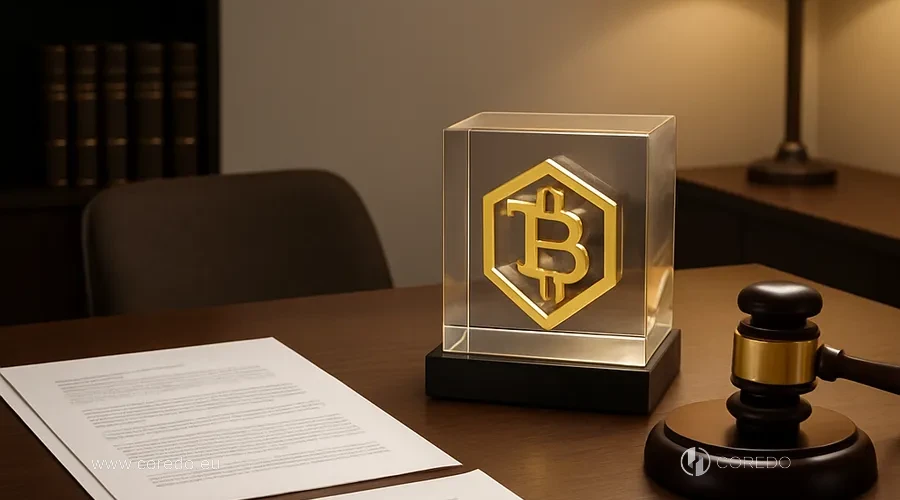
Legal Opinion for crypto projects is a key legal instrument that confirms the legality of a project’s structure and operations in the crypto industry, and also helps reduce risks and meet the requirements of regulators and investors. Understanding what a Legal Opinion is and why it is needed is important for recognizing its role in ensuring transparency, legality, and the successful development of crypto projects.
Legal opinion in the crypto industry
A Legal Opinion for crypto projects is a qualified written opinion by an independent lawyer or law firm, confirming the legal status of a token, project, or transaction in a specific jurisdiction. Such a document not only determines whether a token falls under regulation as a security (security), a utility token, or another digital asset, but also serves as an official confirmation of the project’s compliance with applicable law.
In COREDO’s practice, a legal opinion on cryptocurrency becomes a key tool for listing tokens on exchanges, conducting ICOs, DeFi projects, and tokenizing assets. It is not just a formality, but a risk management and transparency tool for all market participants.
Legal Opinion for Crypto Business: Objectives and Advantages
- Protect investors’ rights in a crypto project by providing a transparent classification of the token and a description of fund return mechanisms.
- Provide legal protection to crypto investors, minimizing the risk of claims and litigation.
- Formalize the token’s status, which is critical for access to banking services, insurance of crypto assets, and interaction with financial institutions.
A solution developed at COREDO for one of the major European DeFi projects not only enabled listing on leading exchanges, but also attracted institutional investors for whom having a Legal Opinion is a mandatory requirement.
Legal Opinion: attracting investments and partner trust
A Legal Opinion for ICOs and other crypto projects becomes a kind of “passport of trust”. Investors and partners demand legal guarantees for crypto assets that are confirmed by an independent opinion. Without such a document, a project risks remaining outside the view of major funds and banks and may face refusals for exchange listings.
COREDO’s practice confirms: having a professional Legal Opinion increases the chances of successful attracting investments and reduces the cost of capital, as investors see transparency and manageability of legal risks.
Features of a legal opinion for crypto projects
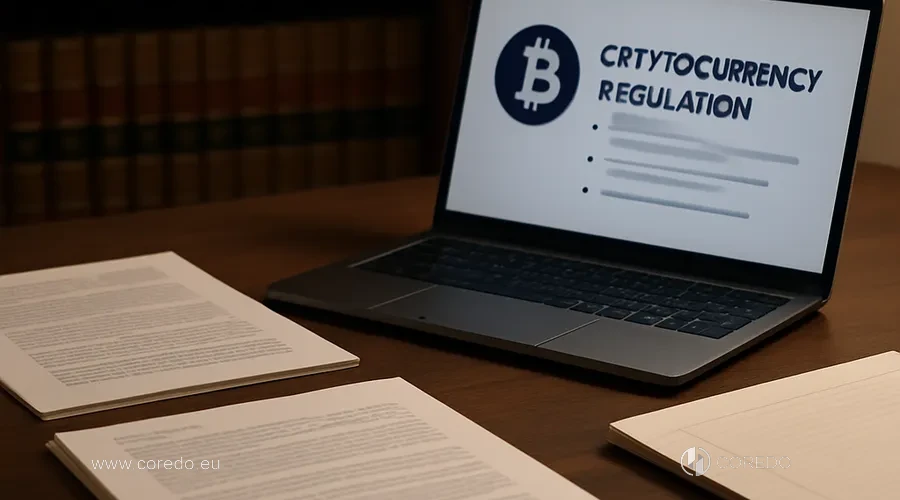
The specifics of preparing a Legal Opinion for crypto projects are driven both by the complexity of regulating digital assets and by the high importance of legal certainty for market participants. In practice, such a document requires not only an in-depth analysis of the applicable law but also a careful choice of jurisdiction, which becomes the lawyer’s first key task when working with crypto projects.
Analysis of legislation and jurisdiction
The key task is to determine the applicable law and the jurisdiction where the project will be implemented or listed. International regulation of crypto assets is highly fragmented: the EU, Asia and the CIS impose different requirements for token classification, AML/KYC and licensing.
The COREDO team has implemented projects in offshore and onshore jurisdictions, including Estonia, Cyprus, the Czech Republic, Singapore and Dubai. For example, for clients targeting the Asian market, we analyze not only local cryptocurrency legislation but also international FATF standards to provide maximum protection against regulators’ claims.
Token classification and the Howey Test
One of the key stages is classifying tokens as securities or utility tokens. Methods used for this include the Howey Test, Family Resemblance and Risk Capital tests.
| Criterion | Howey Test | Family Resemblance | Risk Capital |
|---|---|---|---|
| Applied where | USA, EU | USA (alternative) | Japan, Korea |
| Main question | Investment contract? | Similar to a traditional security? | Is there a risk of capital loss? |
| Significance for tokens | Determines status as a security or utility | Flexible classification | Analyzes the economic substance |
In one of COREDO’s cases for a European crypto exchange, applying the Howey Test made it possible to avoid recognizing the token as a security and to obtain a positive Legal Opinion for listing on the exchange.
Features of a Legal Opinion for ICOs and DeFi
A Legal Opinion for ICO projects requires a specific focus on disclosure, KYC/AML procedures and investor protection. For DeFi platforms and asset tokenization projects, it is critical to analyze smart contracts, governance and profit distribution mechanisms, as well as compliance with international standards.
The COREDO team supported the launch of a DeFi platform in Estonia, where special attention was paid to the Legal Opinion for asset tokenization taking into account EU requirements and MiCA.
Compliance and AML/KYC in the preparation of the opinion
Exchange compliance and AML/KYC checks are an integral part of preparing a Legal Opinion. A risk-based approach to cryptocurrency requires not only formal client identification but also analysis of sources of funds, monitoring of suspicious transactions and integration of international sanctions lists.
COREDO’s experience shows: implementing comprehensive compliance procedures reduces the likelihood of account freezes, fines and criminal prosecution.
Legal risks of crypto projects and how to minimize them
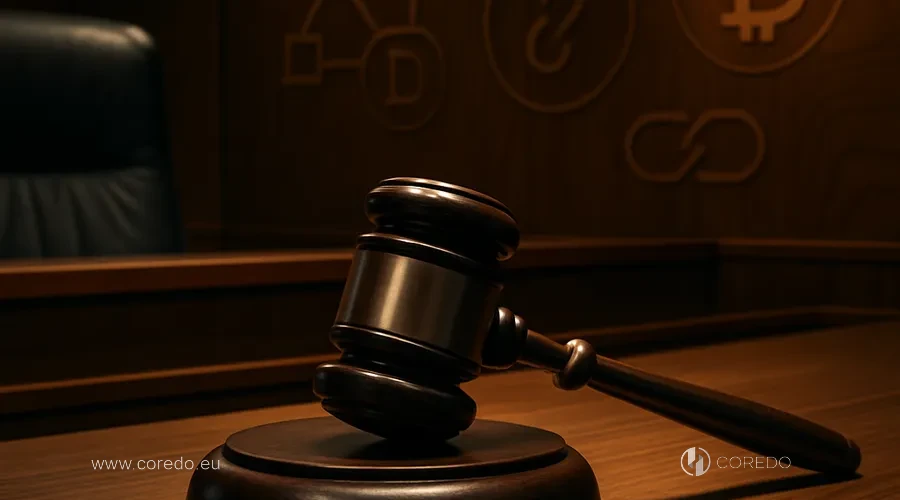
The main legal risks of crypto projects are often related to ambiguous token classification and the lack of clear regulation at the international level. Understanding these aspects is the first step to minimizing potential problems and protecting the interests of both investors and project organizers.
Risks of token classification and regulation
Cryptocurrency risks are directly linked to uncertainty in token regulation in the EU, Asia and the CIS. Incorrectly classifying a token as a utility token may lead to accusations of unlawful issuance of securities, fines and prohibition of activities.
Legal risks of DeFi platforms include issues of decentralized governance, the absence of a single responsible entity, and difficulties in protecting investors’ rights.
Risks of money laundering and terrorism
Money laundering using cryptocurrency and the financing of terrorism remain a focus for regulators. International AML standards require the implementation of KYC, transaction monitoring and reporting of suspicious operations.
In one of COREDO’s cases for a crypto exchange in Singapore, the implementation of an automated AML system made it possible to pass a Monetary Authority of Singapore audit and obtain a license to operate.
Risks of lawsuits for investors
Legal protection for crypto investors becomes relevant in cases of an exchange’s bankruptcy, wallet hacks or fraudulent actions by a token issuer. Protecting investors’ rights in crypto projects requires clear mechanisms for fund recovery, claims handling and arbitration clauses in smart contracts.
COREDO’s practice confirms: having a well-thought-out legal structure minimizes the risk of lawsuits and provides for pre-litigation dispute resolution.
Technical and operational risks of an exchange: volatility, attacks, bankruptcy
Price volatility, fraud in cryptocurrency trading, exchange bankruptcy and irreversible loss of funds are key operational threats. The absence of crypto-asset insurance and compensation mechanisms increases these risks.
The solution implemented by COREDO for one of its clients in the UK included the deployment of a cold-storage key backup system and insurance for digital assets.
Environmental and reputational risks of mining and stablecoins
Environmental risks of cryptocurrency mining are associated with high energy consumption and negative perception by society and regulators. Legal opinions on stablecoins require separate analysis, as regulators in the EU and the US are tightening requirements for collateralization and transparency of such assets.
The process of obtaining a legal opinion: stages and key points
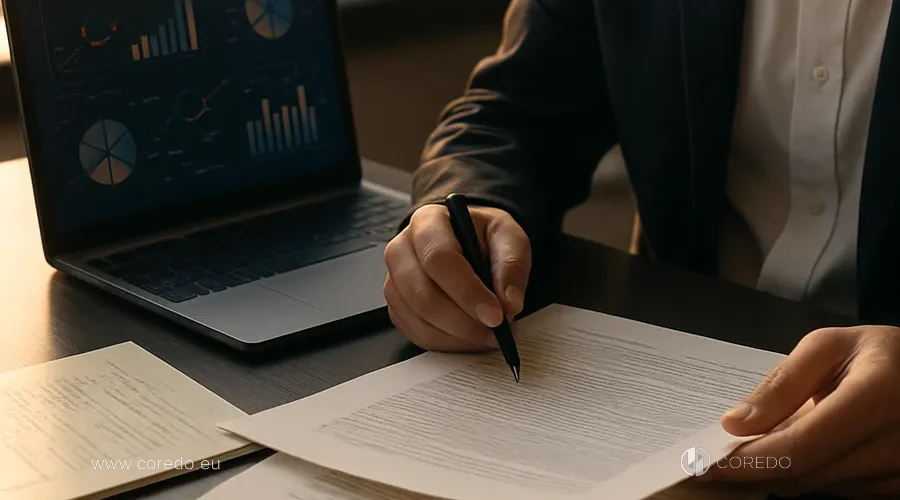
The process of obtaining a Legal Opinion includes several distinct stages, at each of which it is important to consider key points to ensure the quality and reliability of the opinion. Choosing a competent lawyer or law firm: the first and decisive step that influences the effectiveness of the entire process.
How to choose a lawyer for a legal opinion?
- Deep knowledge of international cryptocurrency legislation.
- Experience in supporting projects in the chosen jurisdiction.
- Experience working with regulators and financial institutions.
COREDO assembles a team of experts with specialized profiles for each task – this makes it possible to take into account the specifics of the jurisdiction and the industry.
Analysis of facts and documents
Legal expertise begins with examining the factual circumstances: analysis of the business model, token structure, smart contracts, sources of funding and documentation. The legality check is conducted taking into account the latest changes in the regulatory framework.
In one of COREDO’s cases for a Singaporean startup, a thorough audit of the documents made it possible to identify potential risks and adjust the White Paper before applying for listing.
Preparation of the Legal Opinion
- Official status and confirmation of the token’s status.
- Description of the applicable law and jurisdiction.
- Analysis of compliance with legislation, including AML/KYC and compliance.
- Recommendations for risk minimization and further actions.
COREDO standard: to provide a Legal Opinion recognized by leading exchanges and financial institutions.
Timeframe and cost of obtaining a Legal Opinion
The process of obtaining a Legal Opinion takes from 2 to 6 weeks depending on the complexity of the project and the jurisdiction. The cost of a Legal Opinion ranges from €5,000 to €30,000 depending on the scope of the review and the specifics of regulation.
I recommend starting preparation of the Legal Opinion at an early stage, before launching the token or conducting an ICO. This allows timely adjustment of the business model and helps avoid costly mistakes.
International Regulation of Legal Opinion
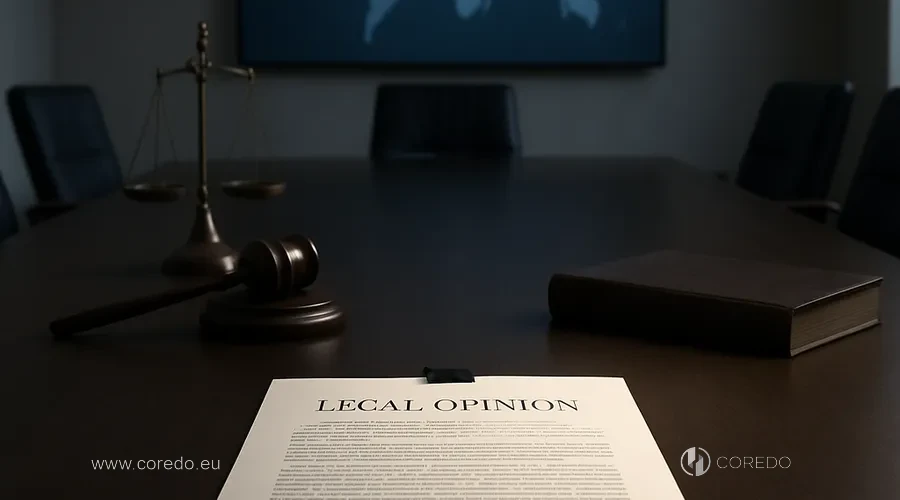
International cryptocurrency regulation is becoming increasingly strict and standardized, however jurisdictional specifics continue to have a decisive influence on the practice of applying the rules. A Legal Opinion on the crypto market requires a clear understanding of the differences between regions, especially in the key jurisdictions of the EU, Asia and the CIS.
Cryptocurrency regulation in the EU, Asia and the CIS
Regulation in the EU (for example, MiCA), Asia (Singapore, Hong Kong, Japan) and the CIS differs significantly in approaches to token classification, AML/KYC requirements and licensing. In the EU the emphasis is on investor protection and transparency, in Asia on innovation and technological development, in the CIS on adapting international standards.
The COREDO team has implemented projects in the Czech Republic, Slovakia, Cyprus, Estonia, Singapore and Dubai, which allows taking into account the nuances of each jurisdiction and choosing the optimal strategy for registering a crypto project.
Choice of law and arbitration in crypto contracts
The choice of applicable law and the inclusion of arbitration clauses in smart contracts are critical for protecting the parties’ interests in cross-border transactions. Pre-litigation dispute resolution, claims work and clearly defined conflict resolution mechanisms minimize the risk of court proceedings.
COREDO recommends using international arbitration centers and jurisdictions with developed case law on digital assets.
Registration and licensing of crypto projects by jurisdiction
Registration of a crypto project and Licensing of crypto business require taking into account requirements for authorized capital, the presence of resident directors, maintaining registers of controllers and compliance with ongoing compliance. An offshore jurisdiction for crypto projects can provide flexibility but requires special attention to AML and reputational issues.
COREDO’s practice shows: the right choice of jurisdiction and timely licensing open access to international markets and protect against regulatory risks.
Practical recommendations for entrepreneurs
Practical recommendations and key conclusions for entrepreneurs and executives will help reduce legal risks when launching and scaling a crypto project. In a rapidly changing regulatory landscape, it is important to take legal aspects into account in advance and build a strategy considering current requirements.
How to minimize legal risks of a crypto project
- Regular audit of the business model and documentation.
- Implementation of compliance procedures and transaction monitoring.
- Updating the Legal Opinion when legislation or business strategy changes.
How to ensure compliance and investor protection
- Crypto exchange compliance and AML/KYC checks should be integrated into every stage of the project’s lifecycle.
- Legal protection of investors is achieved through transparent refund mechanisms, insurance of crypto assets and implementation of corporate governance standards.
Choosing a lawyer for your crypto business and legal support
Legal support for crypto companies requires not only expertise but also the ability to operate in conditions of high regulatory uncertainty. Criteria for the quality of a Legal Opinion are international recognition, experience working with regulators, transparency and accountability.
What should I do if the legal opinion is negative?
Consequences of a negative Legal Opinion can include listing refusals, account freezes and lawsuits. In such a situation it is important to:
- Conduct a repeat legal review.
- Adjust the business model and documentation.
- Use mechanisms for judicial protection of crypto investors and pre-trial settlement.
Comparison of key tests for token classification
| Test | Jurisdiction | Criteria | Relevance for crypto projects |
|---|---|---|---|
| Howey Test | US, EU | Investment contract | Determines security/utility status |
| Family Resemblance | US | Resemblance to a traditional security | Flexible classification |
| Risk Capital | Japan, Korea | Risk of loss of capital | Economic analysis |
Major legal risks of crypto projects and their mitigation
| Risk | Mitigation methods |
|---|---|
| Incorrect token classification | Professional legal opinion, audit |
| AML/KYC violations | Implementation of compliance procedures |
| Investor lawsuits | Transparent documentation, arbitration clauses |
| Volatility and loss of funds | Asset insurance, reserve mechanisms |
| Environmental and reputational | Impact assessment, ESG reporting |
Stages of obtaining a Legal Opinion for a crypto project
- Analysis of the business model and project objectives
- Selection of jurisdiction and applicable law
- Collection and audit of documents
- Token classification and risk analysis
- AML check/KYC and compliance
- Preparation and approval of the Legal Opinion
- Implementation of recommendations and updating documentation
COREDO’s experience confirms: a strategic approach to a Legal Opinion is an investment in the resilience, trust and scalability of your crypto business. If you want to stay ahead of the market, act systematically and professionally, and legal risks will then become not a threat but a manageable tool for growth.